Miao Su
Beyond Dialogue Time: Temporal Semantic Memory for Personalized LLM Agents
Jan 12, 2026Abstract:Memory enables Large Language Model (LLM) agents to perceive, store, and use information from past dialogues, which is essential for personalization. However, existing methods fail to properly model the temporal dimension of memory in two aspects: 1) Temporal inaccuracy: memories are organized by dialogue time rather than their actual occurrence time; 2) Temporal fragmentation: existing methods focus on point-wise memory, losing durative information that captures persistent states and evolving patterns. To address these limitations, we propose Temporal Semantic Memory (TSM), a memory framework that models semantic time for point-wise memory and supports the construction and utilization of durative memory. During memory construction, it first builds a semantic timeline rather than a dialogue one. Then, it consolidates temporally continuous and semantically related information into a durative memory. During memory utilization, it incorporates the query's temporal intent on the semantic timeline, enabling the retrieval of temporally appropriate durative memories and providing time-valid, duration-consistent context to support response generation. Experiments on LongMemEval and LoCoMo show that TSM consistently outperforms existing methods and achieves up to 12.2% absolute improvement in accuracy, demonstrating the effectiveness of the proposed method.
StruProKGR: A Structural and Probabilistic Framework for Sparse Knowledge Graph Reasoning
Dec 14, 2025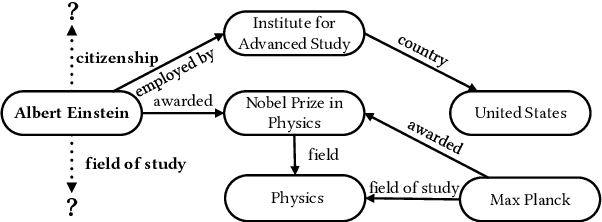
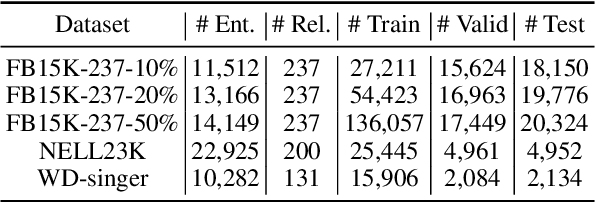
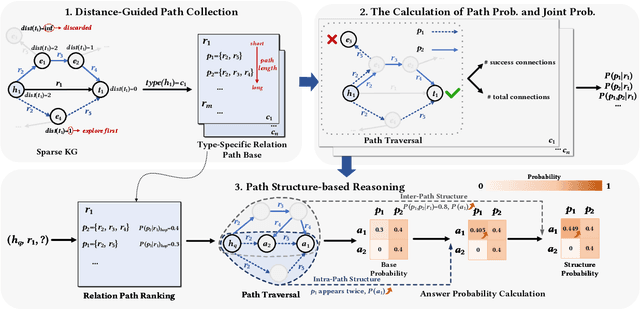
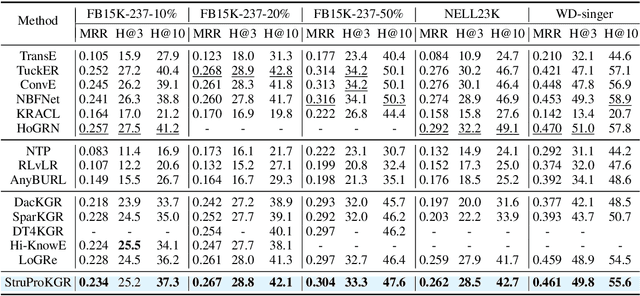
Abstract:Sparse Knowledge Graphs (KGs) are commonly encountered in real-world applications, where knowledge is often incomplete or limited. Sparse KG reasoning, the task of inferring missing knowledge over sparse KGs, is inherently challenging due to the scarcity of knowledge and the difficulty of capturing relational patterns in sparse scenarios. Among all sparse KG reasoning methods, path-based ones have attracted plenty of attention due to their interpretability. Existing path-based methods typically rely on computationally intensive random walks to collect paths, producing paths of variable quality. Additionally, these methods fail to leverage the structured nature of graphs by treating paths independently. To address these shortcomings, we propose a Structural and Probabilistic framework named StruProKGR, tailored for efficient and interpretable reasoning on sparse KGs. StruProKGR utilizes a distance-guided path collection mechanism to significantly reduce computational costs while exploring more relevant paths. It further enhances the reasoning process by incorporating structural information through probabilistic path aggregation, which prioritizes paths that reinforce each other. Extensive experiments on five sparse KG reasoning benchmarks reveal that StruProKGR surpasses existing path-based methods in both effectiveness and efficiency, providing an effective, efficient, and interpretable solution for sparse KG reasoning.
RouteRAG: Efficient Retrieval-Augmented Generation from Text and Graph via Reinforcement Learning
Dec 10, 2025Abstract:Retrieval-Augmented Generation (RAG) integrates non-parametric knowledge into Large Language Models (LLMs), typically from unstructured texts and structured graphs. While recent progress has advanced text-based RAG to multi-turn reasoning through Reinforcement Learning (RL), extending these advances to hybrid retrieval introduces additional challenges. Existing graph-based or hybrid systems typically depend on fixed or handcrafted retrieval pipelines, lacking the ability to integrate supplementary evidence as reasoning unfolds. Besides, while graph evidence provides relational structures crucial for multi-hop reasoning, it is substantially more expensive to retrieve. To address these limitations, we introduce \model{}, an RL-based framework that enables LLMs to perform multi-turn and adaptive graph-text hybrid RAG. \model{} jointly optimizes the entire generation process via RL, allowing the model to learn when to reason, what to retrieve from either texts or graphs, and when to produce final answers, all within a unified generation policy. To guide this learning process, we design a two-stage training framework that accounts for both task outcome and retrieval efficiency, enabling the model to exploit hybrid evidence while avoiding unnecessary retrieval overhead. Experimental results across five question answering benchmarks demonstrate that \model{} significantly outperforms existing RAG baselines, highlighting the benefits of end-to-end RL in supporting adaptive and efficient retrieval for complex reasoning.
Mixture Policy based Multi-Hop Reasoning over N-tuple Temporal Knowledge Graphs
May 19, 2025Abstract:Temporal Knowledge Graphs (TKGs), which utilize quadruples in the form of (subject, predicate, object, timestamp) to describe temporal facts, have attracted extensive attention. N-tuple TKGs (N-TKGs) further extend traditional TKGs by utilizing n-tuples to incorporate auxiliary elements alongside core elements (i.e., subject, predicate, and object) of facts, so as to represent them in a more fine-grained manner. Reasoning over N-TKGs aims to predict potential future facts based on historical ones. However, existing N-TKG reasoning methods often lack explainability due to their black-box nature. Therefore, we introduce a new Reinforcement Learning-based method, named MT-Path, which leverages the temporal information to traverse historical n-tuples and construct a temporal reasoning path. Specifically, in order to integrate the information encapsulated within n-tuples, i.e., the entity-irrelevant information within the predicate, the information about core elements, and the complete information about the entire n-tuples, MT-Path utilizes a mixture policy-driven action selector, which bases on three low-level policies, namely, the predicate-focused policy, the core-element-focused policy and the whole-fact-focused policy. Further, MT-Path utilizes an auxiliary element-aware GCN to capture the rich semantic dependencies among facts, thereby enabling the agent to gain a deep understanding of each n-tuple. Experimental results demonstrate the effectiveness and the explainability of MT-Path.
Temporal Knowledge Graph Question Answering: A Survey
Jun 20, 2024Abstract:Knowledge Base Question Answering (KBQA) has been a long-standing field to answer questions based on knowledge bases. Recently, the evolving dynamics of knowledge have attracted a growing interest in Temporal Knowledge Graph Question Answering (TKGQA), an emerging task to answer temporal questions. However, this field grapples with ambiguities in defining temporal questions and lacks a systematic categorization of existing methods for TKGQA. In response, this paper provides a thorough survey from two perspectives: the taxonomy of temporal questions and the methodological categorization for TKGQA. Specifically, we first establish a detailed taxonomy of temporal questions engaged in prior studies. Subsequently, we provide a comprehensive review of TKGQA techniques of two categories: semantic parsing-based and TKG embedding-based. Building on this review, the paper outlines potential research directions aimed at advancing the field of TKGQA. This work aims to serve as a comprehensive reference for TKGQA and to stimulate further research.
KnowCoder: Coding Structured Knowledge into LLMs for Universal Information Extraction
Mar 14, 2024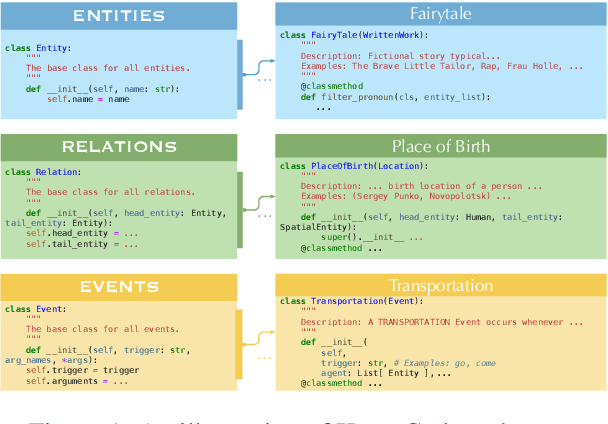

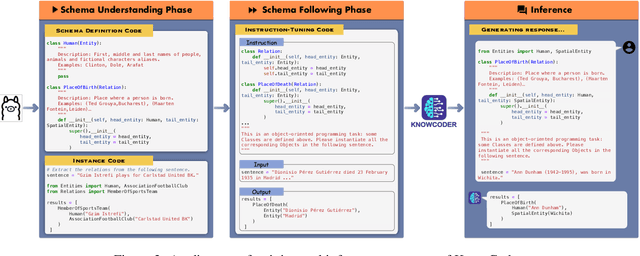
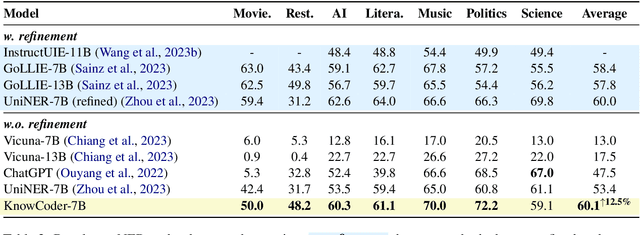
Abstract:In this paper, we propose KnowCoder, a Large Language Model (LLM) to conduct Universal Information Extraction (UIE) via code generation. KnowCoder aims to develop a kind of unified schema representation that LLMs can easily understand and an effective learning framework that encourages LLMs to follow schemas and extract structured knowledge accurately. To achieve these, KnowCoder introduces a code-style schema representation method to uniformly transform different schemas into Python classes, with which complex schema information, such as constraints among tasks in UIE, can be captured in an LLM-friendly manner. We further construct a code-style schema library covering over $\textbf{30,000}$ types of knowledge, which is the largest one for UIE, to the best of our knowledge. To ease the learning process of LLMs, KnowCoder contains a two-phase learning framework that enhances its schema understanding ability via code pretraining and its schema following ability via instruction tuning. After code pretraining on around $1.5$B automatically constructed data, KnowCoder already attains remarkable generalization ability and achieves relative improvements by $\textbf{49.8%}$ F1, compared to LLaMA2, under the few-shot setting. After instruction tuning, KnowCoder further exhibits strong generalization ability on unseen schemas and achieves up to $\textbf{12.5%}$ and $\textbf{21.9%}$, compared to sota baselines, under the zero-shot setting and the low resource setting, respectively. Additionally, based on our unified schema representations, various human-annotated datasets can simultaneously be utilized to refine KnowCoder, which achieves significant improvements up to $\textbf{7.5%}$ under the supervised setting.
Nested Event Extraction upon Pivot Element Recogniton
Sep 22, 2023



Abstract:Nested Event Extraction (NEE) aims to extract complex event structures where an event contains other events as its arguments recursively. Nested events involve a kind of Pivot Elements (PEs) that simultaneously act as arguments of outer events and as triggers of inner events, and thus connect them into nested structures. This special characteristic of PEs brings challenges to existing NEE methods, as they cannot well cope with the dual identities of PEs. Therefore, this paper proposes a new model, called PerNee, which extracts nested events mainly based on recognizing PEs. Specifically, PerNee first recognizes the triggers of both inner and outer events and further recognizes the PEs via classifying the relation type between trigger pairs. In order to obtain better representations of triggers and arguments to further improve NEE performance, it incorporates the information of both event types and argument roles into PerNee through prompt learning. Since existing NEE datasets (e.g., Genia11) are limited to specific domains and contain a narrow range of event types with nested structures, we systematically categorize nested events in generic domain and construct a new NEE dataset, namely ACE2005-Nest. Experimental results demonstrate that PerNee consistently achieves state-of-the-art performance on ACE2005-Nest, Genia11 and Genia13.
 Add to Chrome
Add to Chrome Add to Firefox
Add to Firefox Add to Edge
Add to Edge